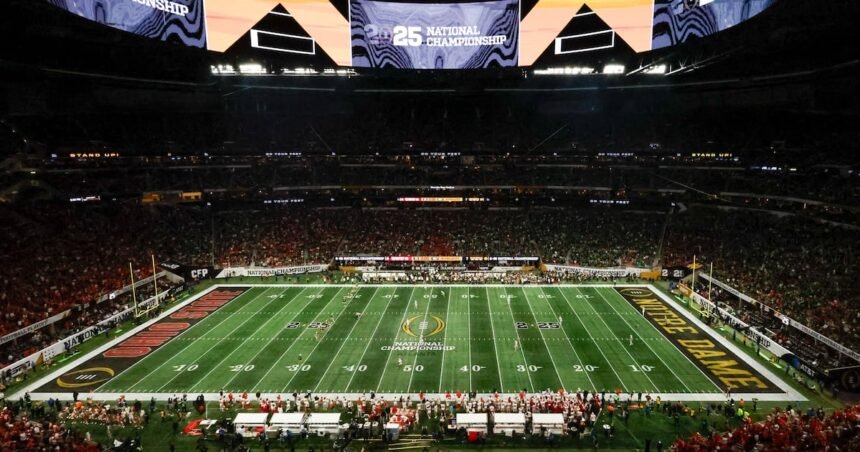The specter of private equity money has loomed as a possibility for funding college athletics programs for a while now.
Big 12 commissioner Brett Yormark floated the possibility of private equity entering the college sports world last summer and he was only one of multiple conference commissioners to do.
Earlier this year, the Big Ten was reported by Sportico to have taken “preliminary bids from private equity firms.”
Special Collector’s Issue: “1984: The Year BYU was Second to None”
Get an inclusive look inside BYU Football’s 1984 National Championship season.
The concept of hedge funds getting involved in college athletics has seemed to be an eventuality, the only question being when it would happen.
Wrote Forbes contributor Joe Moglia in April, “The latest shockwave to hit college football may come from private equity. As billions of dollars in TV revenue have flooded into Power Four football and top players are able to bring in six- and seven-figure name, image, likeness (NIL) deals, it’s impossible to ignore the fact that college football is a business. Big business.
“These are professional student-athletes, and the teams are major sports franchises,” he continued. “But, at the same time, it’s an industry that is being heavily disrupted. In other words, college football is a ripe hunting ground for hedge funds and private equity.”
With the approval of the House settlement, part of which allows schools to pay upward of $20.5 million to student-athletes directly, athletic departments are in need of an influx of funds, and private equity has plenty of them. So it should be of little surprise that private equity has indeed found its way into college athletics.
Sports Business Journal reported early Monday morning that Elevate, a “global agency network” that supports “over 1,000 ambitious brands across sports, entertainment, consumer products, and retail,” has created a $500 million initiative to invest in college sports, backed by private equity firm Velocity Capital Management and the Texas Permanent School Fund.
The purpose of the initiative? To “provide a new funding source for collegiate athletics programs pursuing capital-intensive projects like facility upgrades and renovations,” write Ben Portnoy and Chris Smith.
Per SBJ, Elevate has already come to terms to fund two unnamed Power Four conference programs, with the expectation to come to terms with three to six additional programs before the 2025 season begins in late August.
What’s more, the plan is for Elevate to become a “multi-billion-dollar platform” that invests across college sports in the long term.
Why is private equity interested in college athletics?
The simple answer to this question is the potential for profit.
College athletics is a multibillion-dollar industry that is ever growing.
Per ESPN, the NCAA generated nearly $1.3 billion in revenue in 2022-23, which was up from $1.14 billion the previous year. Most of that revenue (close to 70%) comes from the men’s NCAA Tournament.
College football, meanwhile, brings in an inordinate amount of money to programs.
At the top, as of last year, according to USA Today, programs like Ohio State, Texas, Alabama, Michigan and Georgia all had revenues exceeding $200 million. Of course, expenses were nearly as high, which is where private equity comes in.
The idea is that private equity firms can make athletic departments even more profitable. One way would be by eliminating waste. Multimillion-dollar coaches’ salaries and buyouts have been mentioned as an area rife for change.
“No one with any business sense would allow a major executive to lose repeatedly and then walk away with a multi-million dollar bonus buyout, but this is something that happens regularly in Power Four football. Agents run circles around most athletic directors when it comes to things as basic as employment contracts,” Moglia writes.
Private equity could also get involved “by directly investing in athletic departments, investing in the fan experience, both in and outside of the stadium, or through adding revenue streams outside of the existing network,” Alfie Crooks wrote for Buyout Insider, the idea being that college athletics haven’t been marketed as well as they could be by conferences and the NCAA.
“College athletics remains a relatively untapped market. Its combination of passionate fan bases, strong brand loyalty and long-term income potential makes it an appealing target for investment,” Brian Anderson writes for Sports Business Journal.
There is not an expectation — yet, anyway — that private equity could purchase ownership stakes in college athletic departments/programs, but the potential for that exists in the long run.
Right now, private equity would likely “favor the private credit model because they can better control the exact monetary amount paid out each year,” Bryan Shapiro writes for Duane Morris Sports Law.
Schools, on the other hand, would likely prefer a “traditional private equity model because it allocates risk between the athletic department and investors equally — i.e., if the program increases in value, both entities are rewarded, and on the flip side, if the program decreases in value, the school is not required to pay a specific monetary amount to the investors, which would greatly injure the program and school overall,” Shapiro writes.
What could be the impact of private equity in college sports?
This question has been posed many times over the last few years and various attempts have been made to answer it.
The simplest answer is that an immediate influx of money to departments and programs that otherwise wouldn’t have access to those funds could bring rapid parity to college sports, football especially.
Think lower-tier Power conference schools that rarely, if ever, have been in contention at the top of their leagues legitimately competing alongside the likes of Alabama, Georgia, Ohio State, Michigan and Oregon.
It has already started to happen a bit with the rise of NIL — who can forget Vanderbilt’s 2024 season, during which the Commodores upset the Crimson Tide? — but private equity investment could lead to even more parity.
There is a potential downside, though, and that is the further movement of college athletics away from what it has been for 100-plus years.
Private equity will likely prioritize profits first and foremost and that could lead to some serious changes.
“In all likelihood, the first university to sign a major deal will likely be a smaller Power Four football program,” Moglia writes. “While the biggest programs will have no problem paying players and putting together big NIL packages, smaller schools will likely struggle to be competitive. This is the opening that a firm needs. They’ll approach one of these smaller programs with an offer of $150 million (or more) for 51% of the say in how they run their football program.
“For an AD with little business experience trying to put together a winning program, this will look like a good deal,” he continued. “Cash up front to build a team and a promise from the guys in suits to juice revenue in the future. The problem, of course, is that as soon as this deal is done, revenue growth will become the only priority. The investors won’t balk at putting in their own athletics director and putting profits ahead of players, education, fans and the institution. That’s a horrible, horrible long-term decision for the university, but it’s entirely plausible.”
In a lot of ways, what private equity and college athletics will look like together is as uncertain as the future of college sports in general. And it could be years before any real repercussions are felt from an influx of private equity money into college athletics.
After a few years of speculation that private equity would get involved in college sports, it appears it is now a reality.











